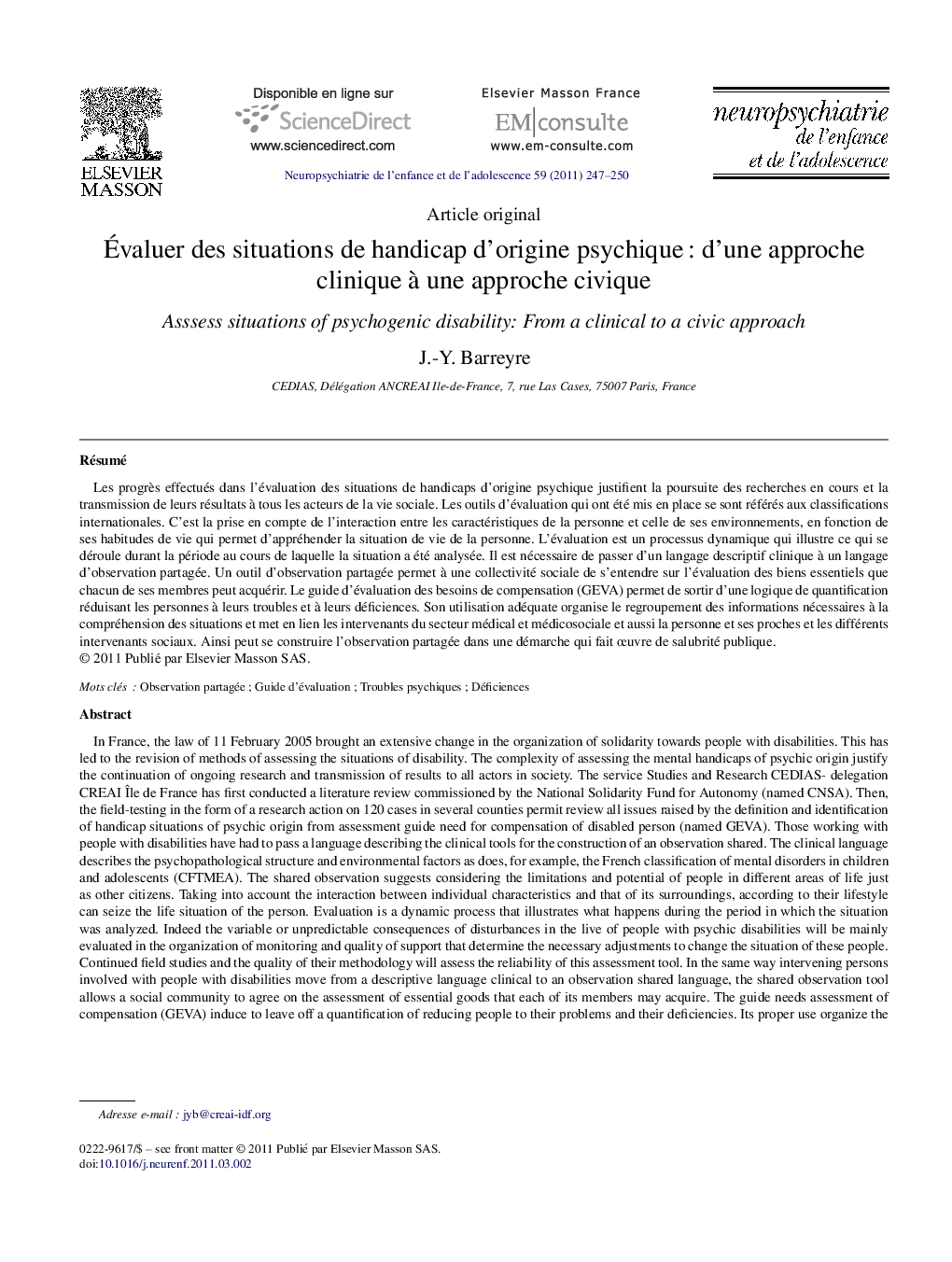| کد مقاله | کد نشریه | سال انتشار | مقاله انگلیسی | نسخه تمام متن |
|---|---|---|---|---|
| 944266 | 925591 | 2011 | 4 صفحه PDF | دانلود رایگان |

RésuméLes progrès effectués dans l’évaluation des situations de handicaps d’origine psychique justifient la poursuite des recherches en cours et la transmission de leurs résultats à tous les acteurs de la vie sociale. Les outils d’évaluation qui ont été mis en place se sont référés aux classifications internationales. C’est la prise en compte de l’interaction entre les caractéristiques de la personne et celle de ses environnements, en fonction de ses habitudes de vie qui permet d’appréhender la situation de vie de la personne. L’évaluation est un processus dynamique qui illustre ce qui se déroule durant la période au cours de laquelle la situation a été analysée. Il est nécessaire de passer d’un langage descriptif clinique à un langage d’observation partagée. Un outil d’observation partagée permet à une collectivité sociale de s’entendre sur l’évaluation des biens essentiels que chacun de ses membres peut acquérir. Le guide d’évaluation des besoins de compensation (GEVA) permet de sortir d’une logique de quantification réduisant les personnes à leurs troubles et à leurs déficiences. Son utilisation adéquate organise le regroupement des informations nécessaires à la compréhension des situations et met en lien les intervenants du secteur médical et médicosociale et aussi la personne et ses proches et les différents intervenants sociaux. Ainsi peut se construire l’observation partagée dans une démarche qui fait œuvre de salubrité publique.
In France, the law of 11 February 2005 brought an extensive change in the organization of solidarity towards people with disabilities. This has led to the revision of methods of assessing the situations of disability. The complexity of assessing the mental handicaps of psychic origin justify the continuation of ongoing research and transmission of results to all actors in society. The service Studies and Research CEDIAS- delegation CREAI Île de France has first conducted a literature review commissioned by the National Solidarity Fund for Autonomy (named CNSA). Then, the field-testing in the form of a research action on 120 cases in several counties permit review all issues raised by the definition and identification of handicap situations of psychic origin from assessment guide need for compensation of disabled person (named GEVA). Those working with people with disabilities have had to pass a language describing the clinical tools for the construction of an observation shared. The clinical language describes the psychopathological structure and environmental factors as does, for example, the French classification of mental disorders in children and adolescents (CFTMEA). The shared observation suggests considering the limitations and potential of people in different areas of life just as other citizens. Taking into account the interaction between individual characteristics and that of its surroundings, according to their lifestyle can seize the life situation of the person. Evaluation is a dynamic process that illustrates what happens during the period in which the situation was analyzed. Indeed the variable or unpredictable consequences of disturbances in the live of people with psychic disabilities will be mainly evaluated in the organization of monitoring and quality of support that determine the necessary adjustments to change the situation of these people. Continued field studies and the quality of their methodology will assess the reliability of this assessment tool. In the same way intervening persons involved with people with disabilities move from a descriptive language clinical to an observation shared language, the shared observation tool allows a social community to agree on the assessment of essential goods that each of its members may acquire. The guide needs assessment of compensation (GEVA) induce to leave off a quantification of reducing people to their problems and their deficiencies. Its proper use organize the reunion of information for understanding situations and connects intervening people in the medical and medico-social fields and also the person and family and various social workers. By changing the point of view on people with mental disorders and their families, the shared observation can be built with an approach that works for public health.
Journal: Neuropsychiatrie de l'Enfance et de l'Adolescence - Volume 59, Issue 4, June 2011, Pages 247–250